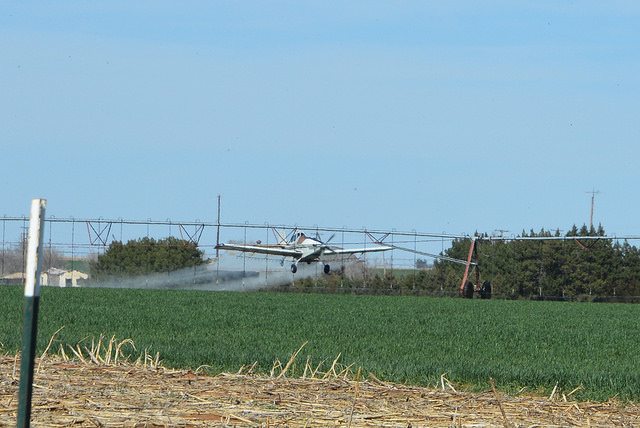Today we will conclude our three part series on pesticide drift liability. In case you missed them, Part 1 focused on potential legal claims that could be made against a landowner and Part 2 looked at whether a landowner could be liable for the acts of an independent contractor. This post will wrap things up with some practical advice for those landowners who spray pesticides as part of their farming or ranching practices.
Use common sense when spraying.
Using simple common sense can avoid numerous issues when it comes to pesticide application. First and foremost, landowners should carefully view and follow the label instructions on any chemical that they are going to use. One of the easiest ways for a plaintiff to show negligence is to show failure to abide by the chemical label. Landowners should not spray when it is windy and should always pay close attention to the direction of any wind that is present. Landowners should do an investigation of what crops, grass, or other vegetation may be in nearby fields and determine which of these crops (like cotton) may be particularly sensitive to pesticide drift. Taking care to ensure that pesticide is applied in a manner to limit the reduce of drift as much as possible is extremely important for landowners. Not only should this oftentimes eliminate drift all together, but in the event that drift does occur, showing that precautions were taken is evidence a defendant will need in litigation.
Do your homework when hiring an applicator.
When hiring an independent contractor to apply pesticide, a landowner should do his or her best to ensure that person is careful and capable. It may seem elementary, but ensuring that the person maintains the required TDA licensing for pesticide application is a good place to start. Landowners may also consider checking with the TDA to determine if there have been any recent complaints against or violations attributed to the potential applicator. The landowner should meet with the applicator to discuss spraying practice and bring attention to any sensitive crops in the area. Finally, coffee shop talk can come in handy. Take a moment to ask neighbors and other farmers in the area about their experiences with different pesticide applicators.
Ensure an insurance policy is in place and does not limit coverage for application of pesticides.
First, it is important that any landowner have a good liability insurance policy in place. But merely having a policy–even a farm and ranch policy–is not enough. Landowners must carefully review the policy to ensure there are not limitations on chemical drift liability. Kevin Corzine, an insurance agent in Stamford, Texas, reports that when talking to farmers in his area, many are shocked to find out that some insurance companies limit coverage for chemical drift. For example, certain companies will limit the amount of chemical drift coverage to $50,000, even if the policy limits are much higher. According to Mr. Corzine, another potential issue is the fact that under many policies, chemical drift falls under pollution coverage, for which a total claim limit also likely exists. Further, landowners holding umbrella policies need to be careful to ensure the additional coverage applies to drift.
Landowners should carefully review their policies to determine whether chemical drift is covered and, if so, if there are any monetary limits on claims. In his business, Mr. Corzine has seen more and more chemical drift claims recently, and has been able to increase policy limits for his clients–even to $1 million in some instances–for chemical drift.
Don’t be an idiot like Mr. Johnson.
Finally, a real life “What Not To Do” story. [To read the full case, click here.] An aerial applicator in Louisiana was frequently in trouble with the regulatory body for violating spray regulations. One day, he noticed the state government official standing next to a state-owned pick up taking photos of the plane near the field where the applicator was spraying. Annoyed by this, the applicator proceeded to fly his plan over the government official and spray him with pesticide in retaliation. Not surprisingly, this was a bad idea and not an approved use of the chemical. The applicator lost his license and could well have also faced criminal penalties. Don’t be like Mr. Johnson.













